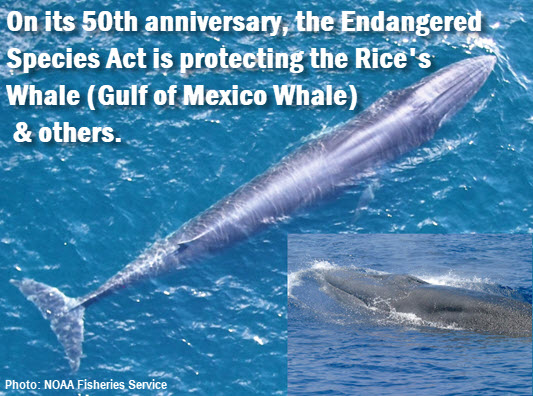On the 50th Anniversary of Endangered Species Act, Protecting Rice's Whales (estimated 100 left) and Others With This Landmark Legislation
December 28, 2023 09:35 am | 2 min read

There are only about 100 Rice's whales left.
They grow to 41 ft and weigh up to 50,000
lbs. | Columbia County Observer graphic
 FLORIDA –
Wildlife experts are spotlighting the Rice's
whale, also known as the Gulf of Mexico
Whale, which was classified as its own
species in 2021, as one of many reasons to
preserve the Endangered
Species Act on its 50th
anniversary.
FLORIDA –
Wildlife experts are spotlighting the Rice's
whale, also known as the Gulf of Mexico
Whale, which was classified as its own
species in 2021, as one of many reasons to
preserve the Endangered
Species Act on its 50th
anniversary.
Since the Endangered Species Act was signed into law in 1973 by President Richard Nixon, the U.S. Fish and Wildlife Service said the act has been one of the world's most important conservation laws.
Experts said the decades of work done to preserve various wildlife is needed for the recently identified and endangered Rice's whale, the only baleen whale making the Gulf of Mexico its full-time home, just 60 miles offshore from Pensacola.
Jane Davenport, senior attorney for Defenders of Wildlife, said thanks to the act, scientists can work to secure critical habitat to preserve the fewer than 100 Rice's whales remaining.
"We are not going to let species like the Rice's whale go extinct," Davenport vowed. "It's just a really exciting development but also a cautionary tale that we can't let these species slip through our fingers without doing everything possible to save them."
Rep. Garret Graves, R-Louisiana, is leading legislation, House Resolution 6008, to restrict the Rice's whale's designated habitat, claiming in a statement, "to confront the Biden administration's most recent effort to restrict American energy production in the Gulf of Mexico."
Davenport called Graves' legislation a "Graves mistake" for undermining the "country's bedrock wildlife protection laws." She pointed out protecting endangered wildlife does not have to be a one-or-the-other type choice.
"We can either have oil and gas, or we can have large whales. We can either have military training exercises, or we can have whales. We can either have commercial fishing and recreational boating, or we can have whales," Davenport outlined their opponents' position. "That's just a false dichotomy, and on all of those fronts."
The fossil fuel industry opposes measures such as slowing ship speeds in critical whale habitat and excluding the habitat from oil and gas extraction. The affected habitat, located along the continental shelf break, constitutes only about 8% of the total acres available for leasing.
---------
This piece was reprinted by the Columbia County Observer with permission or license. It may not be reproduced in any form without permission or license from the source. Graphics, layout, and additional information, some links, and video added by the Observer.
